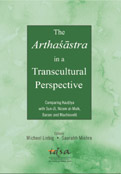You are here
The Arthasastra in a Transcultural Perspective: Comparing Kautilya with Sun-Zi, Nizam al-Mulk, Barani and Machiavelli

About the Book
This book is the product of a collaborative effort by the Institute for Defence Studies and Analyses, New Delhi; South Asia Institute, Heidelberg University; and Institute of South Asian Studies, National University Singapore. The volume contains papers exploring Kautilya’s Arthasastra in a transcultural perspective, comparing it with the thoughts of Sun-Zi, Nizam al-Mulk, Barani and Machiavelli. It is agreed that the field of modern International Relations (IR) and Political Theory is predominantly Eurocentric, and based on European sources of philosophy and history. But, nowadays, scholars have been exploring the possibility of a world intellectual history, as ideas are dynamic throughout temporal and geographical spaces. They transform, hybridise and travel long distances over a period of time in such a manner that they appear belonging to the place where we find them at a particular point of time. It is also intriguing to observe that India, with a long civilisational and philosophical history, is credited with no contribution to the evolution of the modern IR and Political Theory. Therefore, this volume explores the philosophical systems, thought-figures and ancient cultural spaces, on the path from India to Europe, looking for any possibility of Kautilya’s Arthasastra, the most comprehensive and systematic text available on art of governance from ancient India, having interacted and influenced the evolution of IR and Political Theory that are considered as originally European intellectual contributions. We note that the chapters in this book give ample and convincing reasons for initially believing in the Arthasastra’s value for the evolution of IR and Political Theory, and making further research on Indian contribution to the intellectual history of IR and Political Theory a desideratum.
About the Editors
Dr. Michael Liebig is a Fellow at the South Asia Institute (SAI), Heidelberg University, Germany and lectures at SAI's Political Science department. His research interests are comparative political theory, politico-strategic culture and comparative Intelligence Studies. He has done his Ph.D. at Goethe-University (Frankfurt) on the relevance of Kautilya's Arthasastra for contemporary India. On that subject area, he has published several books and essays. Prior to his academic work, Michael Liebig worked as a journalist.
Dr. Saurabh Mishra is currently working at the Institute for Defence Studies and Analyses (IDSA), New Delhi. He has done his Ph.D. from Banaras Hindu University, Varanasi, India on “Globalisation and Transnational Conflict: In the Context of Expansion and Cultural Homogeneity”. His areas of interests are Globalisation, Peace and Conflict, International Institutions, and India. He has been associated with the Indigenous Historical Knowledge Project at the IDSA since its inception; and has co-edited three volumes on “Kautilya and His Vocabulary” produced under the project.
Contents
Preface
Contributors
1. Introduction - Michael Liebig and Saurabh Mishra
2. Kautilya Redux? Re-use, Hybridity, Trans-cultural Flow and Resilience of the State in India - Subrata K. Mitra
3. Understanding Kautilya’s Arthasastra: Origination, Migration and Diffusion - Pradeep Kumar Gautam
4. Kautilya and Machiavelli in a Comparative Perspective - Michael Liebig
5. Arthasastra: Reflections on Thought and Theory - Medha Bisht
6. Rajadharma, Legitimacy and Sovereignty in the Arthasastra - Saurabh Mishra
7. Kautilya and Sun-Zi: Comparative Philosophical Analysis - M.S. Prathibha
8. Fatawa-ye-jahandari: Hybrid Political Theory in the Delhi Sultanate (Perso-Islamic and Endogenous Traditions of Statecraft in India) - Seyed Hossein Zarhani
References
Index
Book Review
Kishan S Rana, The Book Review, September 2017
Order Hard Copy
Please email us at adps.idsa [at] nic.in or call +91-11-2671 7983 (Ext. 7303)


